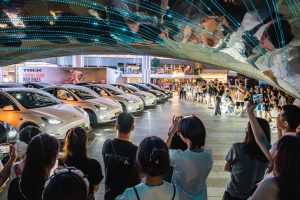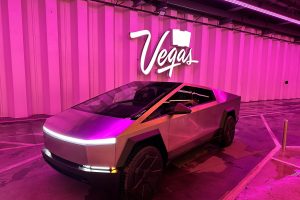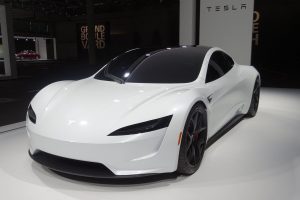Tesla battery partner Panasonic cut its 2023 outlook by 12.5 percent after it missed earnings expectations. The Japanese company will lean on automotive batteries, including the 2170 and 4680 chemistries, to improve profitability for operations this year.
Panasonic’s Earnings Call on Thursday revealed it struggled with headwinds caused by a weakened global economy and high raw material prices.
Its nine-month net profit attributable to stockholders decreased to 162.9 billion yen ($1,267,972,875) from 195.6 billion yen ($1,522,501,500) during the same period a year prior. Operating profit also slid by a considerable margin, 85 percent, which can mostly be attributed to the rise in price for raw materials.
Panasonic will lean on automotive battery supply deals to grow profits, especially with 4680 and 2170 battery cells, which are used in electric vehicles. The 2170 cell has been used in Tesla Model 3 and Model Y vehicles for years, and was an improvement from the 18650 cells used in flagship Model S and Model X vehicles.
In a presentation during the Earnings Call, Panasonic stated it would “Focus on North America market where we can leverage advantages (high capacity) with established strong business foundation; Achieve profit growth by expanding sales of 2170 cells and commercializing 4680 cells.” It also stated it would leverage renovations of its Wakayama Factory in western Japan to promote the commercialization of 4680 cells.
However, Tesla’s unveiling of the 4680 cell chemistry in 2020 brought on a new, more powerful, and more efficient cell that would be used in future EV applications. Tesla has utilized the 4680 cell in some vehicles, but the company is still ramping up production.
Panasonic is planning to begin production of the 4680 cell in Q2. “A pilot line, created first in Japan, made it possible to start large-scale prototype production in May,” Panasonic’s energy business CEO Kazuo Tadanobu said at a company investor event last year.
The cells will eventually be built in the United States as Panasonic plans to invest 600 billion yen ($4,670,250,000) through March 2025 to establish a battery manufacturing plant in Kansas. The plant’s U.S.-based manufacturing is a strategic move that will help automakers qualify for tax credits through the Inflation Reduction Act, which incentivizes the production of battery cells and EVs in North America.
In mid-December, Panasonic signed a supply deal with Lucid Motors to provide EV batteries for its Air lineup.





